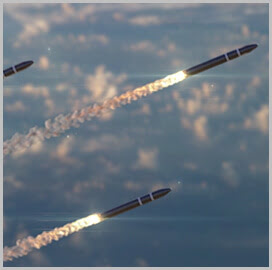
NGI component technology
Lockheed Martin Tests Prototype Radio Technology to Enable Next Generation Interceptor
Maryland-headquartered Lockheed Martin announced that a recent test proved the practical applications of its prototype communications radio technology for enabling the United States’ new ballistic missile defense system called the Next Generation Interceptor. Testing recently conducted at a company facility in Sunnyvale, California, showed that the interceptor’s communications system can operate through various harsh and adversarial environments that may be encountered during flight, Lockheed said Monday.
In a statement, the company emphasized the communication technology that was successfully tested is important because it provides in-flight situational awareness, enabling elements of the interceptor to effectively respond to complex threats.
In developing the prototype, Lockheed’s NGI team received help from Texas-based semiconductor manufacturer X-Microwave. The partnership allowed hardware platforms for software-defined radio development to be delivered in weeks, rather than months, according to Lockheed.
Sarah Reeves, vice president and program manager of the NGI program at Lockheed, said the recent milestone is the latest in a line of successful tests of technologies needed to enable the NGI. She said such successes allow the company’s engineers to learn and better manage risks.
The first Lockheed Martin NGI is expected to be rolled out sometime in 2027.
In March 2021, Lockheed Martin and Northrop Grumman were awarded separate contracts to develop the NGI. The program has an estimated maximum value of $1.6 billion through the fiscal year 2022, according to the Department of Defense.

Category: Defense and Intelligence




